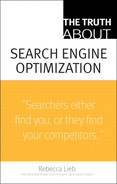Search engine optimization (SEO) is the art and the science of getting a website to appear prominently in organic search engine results when a search submits a query relevant to that website.
In other words, it’s about standing out from the crowd. It’s being front-and-center when a searcher raises his proverbial hand and says: “Hey! Over here! I’ve got a question and need an answer. Who’s available to help?”
Often, that question relates to “Where can I buy...?” or “Who can I do business with?” A well-optimized website, therefore, is something akin to the Holy Grail of marketing. It provides the right message to the right person at the right time.
And who’s the person in question? Well, everyone. Very close to literally everyone, given that the overwhelmingly majority of people in developed countries are online—and searching. Search long ago became the second-largest online activity (after email). Search has evolved from merely providing answers to stated problems and queries. Today, it’s the way most people navigate the Web. The major search engines are so good and so fast, search has largely replaced even the necessity of bookmarking favorite online destinations. In recent years, we’ve even seen the search bar come close to taking the place of the navigation bar in most major web browsers.
Even the most casual searcher has noticed that search is changing. It’s becoming deeper, more specific, more personalized, and more customized. Now, searchers can search for (and site owners can optimize for) shopping, blogs, video, images, local resources, books, or audio files. There’s almost nothing on the Web that can’t be found by, or optimized for, search engines, from the Big Three (Google, Yahoo!, and MSN) to a clutch of highly specialized search engines.
If marketers didn’t think being found on search engines was critical to their business strategy, the Big Three would hardly be so big. A company like 10-year-old Google rocketed from obscurity to becoming a multibillion market cap company because marketers are confident that investing in search engine advertising is a wise move. That’s why paid search advertising accounted for 41 percent of the $17 billion spent on interactive advertising in 2007. Search is the fastest-growing marketing segment of the Internet, which, in turn, is the fastest-growing channel in the history of media.
The purpose of this book is to introduce you to the basic precepts, principles, strategies, and tactics inherent in search engine optimization. It’s about how to make your website “findable” by the right person at the right time.
It’s not a book for geeks. It will not teach you how to write code, or get you up to your elbows in programming. But whether you’re a small webmaster or a chief marketing officer overseeing a search optimization initiative, you will learn tactics, strategies, and best practices for wrapping your arms around this whole search thing.
If you’ve got a business with a web presence, not being findable on the major search engines is akin to not being listed in the phonebook—only worse, perhaps.
How can you possibly afford to pass up the opportunity to be there when potential customers or clients come looking for you? At the same time, how can you ensure that they find you for the right queries? Your “steel drums” may be musical instruments, or they may be industrial parts. A properly executed SEO strategy helps you be conspicuously “there” for contextually relevant search queries. The goal, after all, isn’t just to attract traffic to a website, but qualified traffic. Both the site owner and the searcher alike benefit from solid SEO.
Finally, a note. Although this book deals with optimizing for all search engines great and small (including some you’ve likely never heard of), you’ll find a preponderance of references to Google, and with good reason. By May 2008, a mind-boggling 71.5 percent of all searches in the United States were conducted on Google (source: Compete). Yahoo! lags far, far behind with 13.3 percent, and the remaining 15 percent or so is splintered between MSN, Ask.com, AOL, and others. If the tactics and practices in this book favor Google as the benchmark of all things search, that’s because it is. Google is bigger than the proverbial 500-pound gorilla. In search, it’s more like Godzilla. I’ve, therefore, made an effort not to favor Google in this book, but to present today’s market realities that will doubtless hold true far into the foreseeable future—and beyond.
Rebecca Lieb
New York City
